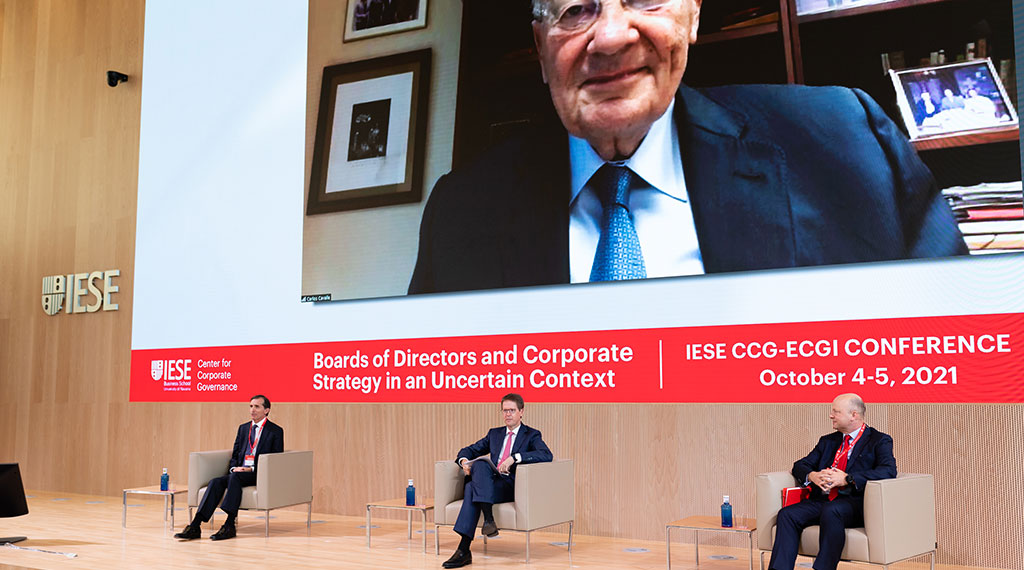Stories
Six keys for excellent directors
Directors Forum looks at growing demands on boards
Repsol CEO Josu Jon Imaz speaks at the 7th annual Directors Forum in Madrid.
Photo: KPMG
June 21, 2019

Being an excellent director and creating a truly effective board are ever more difficult objectives to attain. It’s no longer enough for companies to have uniform boards with a narrow focus on financial results and strategic plans.
The 7th annual Directors Forum, held on the Madrid campus and organized by IESE together with KPMG and the newspaper El País, was the setting for a lively debate that reached a number of practical conclusions both for experienced directors and for those who aspire to be.
The forum gathered business and government leaders such as the chair of Spain’s CNMV, Sebastián Albella; Repsol CEO Josu Jon Imaz; the CEO of Merlin Properties, Ismael Clemente; the director and vice-chair of Banco Santander España, Isabel Tocino; and Ana de la Cueva, secretary of state for economy and business.
The speakers highlighted six key recommendations necessary for success as a director:
- Act with responsibility and transparency. Albella noted that people expect socially responsible behavior from directors and firms. “Companies are not just the shareholders, but also their interest groups, which includes everyone from employees to local communities in which they operate,” Imaz said. Nor is it enough merely to comply with ever more complex regulations. Pablo Bernad, a partner in KPMG, said directors’ responsibilities have never been greater, because now they also have to deal with “reputational risks, protection against cyber-attacks, geopolitical changes and the challenges of the digital transformation itself.” Ana de la Cueva pointed out that the government, for its part, is taking legal measures to promote transparency in directors’ remuneration.
- Find balance. Board members must support senior management, but also supervise and control what they do. Their independence, warned Albella, is fundamental. At the same time, an excellent director should require short-term results but also learn to sacrifice a part of those results if necessary to benefit the company in the long term. It’s an extremely difficult balance. “Directors must define company strategy while not defining it too much, so that senior management has room to maneuver,” said Juan Lázaro, an independent director and member of auditing commissions such as that of Aegon Santander Vida.
- Avoid excesses. Greater importance given to the intangibles of a company shouldn’t reduce attention on companies’ accounts and financial statements. Imaz also signalled the inherent risk in Spain or Europe fighting more than anybody else against emissions and climate change. “Europe only generates 10% of world CO2 emissions, and it is a war that cannot be won alone,” Imaz said.
- Embrace talent and diversity. Albella recommended outside selection processes based on skillsets when choosing board members. Imaz warned of the dangers of “a board of clones” as opposed to a board of diverse genders, backgrounds and experiences. Nearly all the speakers insisted that diversity is essential to creativity, innovation and proposing disruptive strategies. They also agreed that the board has to promote attracting and retaining top talent as a strategic objective.
- Deal with digital transformation. This presents specific challenges for the board and its members. To start with, the pace of technological change demands a much more flexible company structure, the ability react faster and more dynamic strategic plans. The board of directors has to respond to these demands and recruit talent with knowledge of data science and machine learning.
It must also continuously train in new technologies. Clemente pointed out that the full digitalization of the properties managed and rented by his company “could translate, if we add to it the impact of the universal use of LED lighting, to enormous energy savings.” - Avoid serious errors. Among the most serious errors to be avoided by directors, Lázaro stressed the following: minimizing the competencies of the management team and board itself; designing a strategic plan in which the board does not play a key role; failing to formally follow-up on implementation of the strategic plan; and forgetting that diversity of the board is essential.


